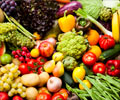Eating more vegetables showed less carotid artery wall thickness among older women. Broccoli, cauliflower, cabbage, Brussels sprouts and other cruciferous vegetables can protect elderly women’s heart health.
Highlights
- Eating more vegetables was associated with less carotid artery wall thickness among older women
- Broccoli, cauliflower, cabbage, Brussels sprouts and other cruciferous vegetables proved most beneficial
- A 0.1 millimeter decrease in carotid wall thickness has a 10 percent to 18 percent decrease in risk of stroke and heart attack
"This is one of only a few studies that have explored the potential impact of different types of vegetables on measures of subclinical atherosclerosis, the underlying cause of cardiovascular disease," said Lauren Blekkenhorst, study lead author and Ph.D. candidate at the University of Western Australia in Crawley.
Details of the Research
Food frequency questionnaires were distributed to 954 Australian women aged 70 and older. The women were instructed to note their vegetable intake ranging from "never eating vegetables" to "three or more times per day". The list of vegetable types included cruciferous, allium (such as onions, garlic, leeks and shallots), red/yellow /orange, leafy green vegetables and legumes. Researchers used Sonograms to measure carotid artery wall thickness and entire carotid trees were also examined to find out severity of carotid plaque.
A 0.05 millimeter lower carotid artery wall thickness between high and low intakes of total vegetables was observed by researchers. "That is likely significant, because a 0.1 millimeter decrease in carotid wall thickness is associated with a 10 percent to 18 percent decrease in risk of stroke and heart attack," Blekkenhorst said.
Dietary Guidelines to Protect Elderly Women from Heart Disease
Researchers however caution that due to the observational nature of this study a causal relationship cannot be definitely established. "Still, dietary guidelines should highlight the importance of increasing consumption of cruciferous vegetables for protection from vascular disease," Blekkenhorst said.
Hardening of Neck Arteries
Two common carotid arteries that are located on each side of the neck provide blood supply to the head. The two carotid arteries divide into the internal and external carotid arteries. While the external carotid artery provides blood supply to the scalp, face, and neck the internal carotid artery supplies blood to the brain.
Accumulation of plaque on the inside of the artery wall can lead to the carotid arteries developing atherosclerosis or 'hardening of the arteries.' Plaque which first begins as a soft, waxy accumulation of cholesterol and triglycerides begins to harden over time and calcify. Gradually the build up of fatty substances and cholesterol narrows down carotid arteries and decreases the flow of blood to the brain. This triggers a stroke risk.
This research suggests by eating more cruciferous vegetables, elderly women can protect themselves from hardening of neck arteries and prevent stroke risk.
Reference:
-
Vegetables may help protect elderly women from hardening of neck arteries
- ( https://newsroom.heart.org/news/vegetables-may-help-protect-elderly-women-from-hardening-of-neck-arteries?preview=0a65f1b646956b8988564742701501df)
Source-Medindia
















